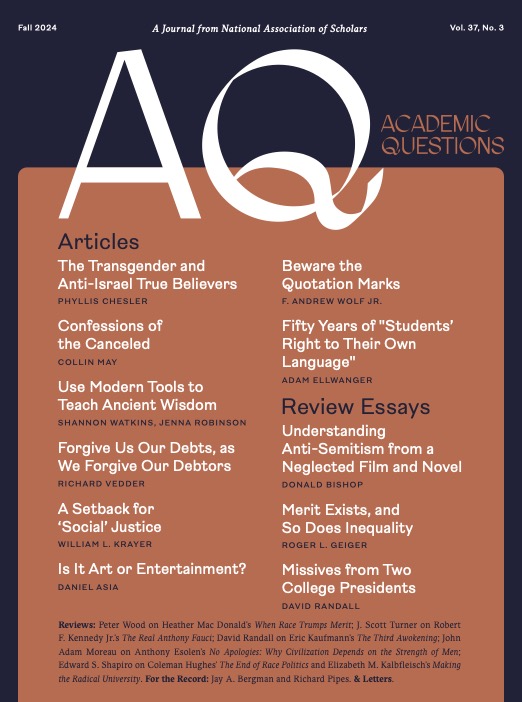Attacking the Elites: What Critics Get Wrong—and Right—About America’s Leading Universities, Derek Bok, Yale University Press, 2024, pp. ix + 234, $28.00 hardcover.
City of Intellect: The Uses and Abuses of the University, Nicholas B. Dirks, Cambridge University Press, 2024, pp. xxix + 358, $39.99 hardcover.
Of course university presidents are confidence men. They must exude confidence in their university to attract donors, professors, and students, and they must persuade everyone they meet, including the man in the mirror, that what they say is true.
And, of course, virtually all university presidents have been liberal-to-radical for half a century and more. Some large part of the confidence they must instill is that their substantive political commitments, and their university’s, have not snapped the university’s commitment to America’s larger ideals and interests. Two recent books by Derek Bok of Harvard and Nicholas Dirks of University of California Berkeley show how the confidence game is played—and, read aright, inform the reader of how not to be played.
Bok in Attacking the Elites articulates and defends what universities do, defends them from critics on the right and left, and proposes modest reforms by the elite universities to restore confidence that they still benefit the nation and the world. Elite universities, private institutions in the United Kingdom and the United States, create beneficial synergies by collecting and lavishing resources upon the best students, teachers, and researchers (5-24). Their civic duties include conscious manipulation of the racial make-up of their student bodies: “Another responsibility that all elite universities have assumed is to diversify the racial composition of their student bodies” (13-14).
Liberal critiques of the university focus on purportedly inequitable admissions, the university’s failure to act politically in the world, and special topics such as their collective guilt for slavery (25-81). Conservative critiques focus on liberal professors indoctrinating students, the immorality and bad consequences of race preferences, and university repression of freedom of speech (83-130). Other issues that matter include improving pedagogy, reforming intercollegiate athletics, and the deepening unionization of the university (131-90). Bok concludes that elite universities are in a more precarious position than their leaders realize and must engage in measured reforms to restore public confidence (16).
Bok irritates with fundamentally misguided commitments and misapprehensions of reality. He is sure of his lifelong commitment to affirmative action and cannot conceive that (for example) the appointment of Claudine Gay to his former position of President of Harvard University is a glaring demonstration of how disastrous his principles have been.
His response to the criticisms of the left is largely that they suggest impractical means to achieve good ends—university divestments, for example, are ineffective tools. His response to the criticisms of the right is either that they are misguided (liberal professors don’t really indoctrinate students) or that they are overwrought critiques of well-intentioned university officials: “In their zeal, [DEI] officials have sometimes acted in ways that seem at odds with the principle of free expression of ideas” (114).
Bok extremely gently suggests that universities need to recommit themselves to free speech: “If the mission of Diversity, Equity, and Inclusion is conceived and staffed entirely as a group to protect the interests of ethnic minorities and LGBTQ students, the effort will run a continuing risk of ignoring the free speech protections for all students and faculty” (120). This is to tour a Gulag and say that the Soviet constitution needs stronger free speech protections.
Bok’s misapprehension of reality is partly the professional deformation of a university president. He apparently believes that administrative devices connect with reality. Does Senator Tom Cotton accuse universities of administrative bloat? “Nor did he seem to be aware that many of these universities have hired teams from leading consulting firms that have spent many months trying to identify unnecessary expenses without discovering anything close to the massive ‘administrative bloat’ he alleges” (194-95).
Are there too few conservatives in the faculty? “Fortunately, most members of existing faculties appear to agree that the lack of political diversity is a legitimate problem. Once they realize that they will not be pressured to compromise their normal intellectual standards for tenure, they should be willing to work with the administration to try to solve the problem” (93).
Bok does not seem to be aware that a “leading consulting firm” is not the gospel, or that the goodwill and open mindedness of university faculty has been empty for generations.
Bok can be astute, as when he approvingly predicts that most elite universities will do what they can to undermine the intent of S.F.F.A. v. Harvard: “They will do what they can within the limits of the law to make the most of the remaining possibilities for admitting a diverse student body and creating greater opportunities for minorities” (108). The nonagenarian president emeritus of Harvard seems least connected to reality when he thinks that the current administrators of Harvard and its peers will listen to him: “Such inconsistent policies [of advertising commitments to both DEI and free speech] are often confusing and make universities seem devious and hypocritical” (202).
Well, yes, at the least. But Bok fails to apprehend that the current administrators clearly prefer DEI to free speech and have no intention of making even the modest reforms he suggests. They have no intention of doing more than mouthing the words he suggests—if that. Bok frustrates when he tries to gull the reader; he evokes pity when he succeeds at gulling himself.
Dirks’ City of Intellect is a memoir of a university administrator a generation younger than Bok, and a generation more radical. Dirks was the child of a liberal Protestant professor who already had sublimated much of his faith into the liberal university; Dirks, coming of age in the late 1960s, continued in this tradition as a secularist, hostile to the Vietnam War, and his interest in India’s thought, culture, and history intimately connected to disaffection from the West—or, as Dirks puts it, “for our contingent convictions about the triumphant character of Western civilization itself” (xxi). His career reflects this keynote disaffection.
So Dirks while teaching in Columbia’s Core Curriculum, “found it possible to mix and match texts, and authors, in a way that emphasized the constitutive role of European empire for the rise of modern western power.… [this had] the effect of casting a long historical shadow on Western ideals” (74-75). As chair of anthropology at Columbia, he finally murdered the department’s old commitment to anthropological rigor:
I was able to use the department to recruit an array of postcolonial scholars—from Africa, Asia, and the Caribbean at first—who began to turn the tables on older anthropological modes of understanding the world, even as we recruited faculty in global feminism and African American studies (38).
Dirks is a poster child for how the professorial termites hollowed out the university.
As Dean at Columbia, he combined sympathy and formal neutrality for the reprehensible Joseph Massad: “I agreed with them that the David Project itself, along with Campus Watch, was an insidious effort to infiltrate the university and stifle political criticism of Israel, [but] I held that the university had to be responsive to concerns on the part of students, whether or not they used outside groups to prosecute their case” (56). More consequentially, “I worked with departmental chairs to identify ‘targets of opportunity’ to help rebuild their departments, and with Jean Howard, a feminist scholar of literature who led the diversity initiative, to diversify them” (63). Dirks’ avowed appreciation for formal institutional neutrality and rights of free speech pales in comparison with his hiring policies, which played a crucial role in revolutionizing Columbia.
Dirks’ career at Berkeley was abortive: the state of California was cutting financial support to UC Berkeley, no one at Berkeley wanted to take responsibility for cutting expenses (programs), Dirks was ultimately responsible for the mishandling of a sexual assault accusation, and so he resigned after a few years as Chancellor, with the parting gift of public invective against Donald Trump (154-55) and revised sexual harassment procedures that “streamlined the process not just for investigations but also for disciplinary action” (166).
Dirks’ memoir of Berkeley matters more for revealing the crucial importance of unpunished protest in the radicalization, in the progressive ungovernability, of the university. Bok refers briefly to a student occupation of a building, where he refused to negotiate, but also apparently declined to punish the malefactors (56). Dirks at Columbia complacently appeased “hunger strikers” with tenure lines in ethnic studies (68). Berkeley’s thuggery is startling even by those standards: Dirks casually mentions that University of California President Mark Yudof “had to move from one house to another to avoid having protestors outside his residence on a regular basis, and at one point he ran through a mall (he was not a sprinter) to avoid being overtaken by a group of self-proclaimed anarchists” (104). You cannot have freedom, or even education, where thugs chronically intimidate and threaten violence, and go unpunished.
Dirks himself failed calamitously to maintain order at Berkeley. He recollects his failure in banal language. Of Milo Yiannoupoulos’ violently aborted speech: “We had more than 100 police on duty but given that we did not want to further incite violence, they seemed unable to prevent the antifas protestors from charging the student union” (159). We and they do yeoman work in obscuring Dirks’ individual dereliction of duty. Dirks merely complains: “Berkeley was left spending millions of dollars to keep the peace both when Ben Shapiro came in the fall of 2017 and when Milo shortly thereafter popped into the campus … Berkeley had been at the center of a concerted effort to weaponize the First Amendment” (162).
Bok oversaw the appointment of a generation of Dirkses; Dirks oversaw the appointment of the current generation of Claudine Gays and Nemat Shafiks. Both fostered a university where “activism” to render universities Judenrein is the new normal. Did they even know what they were doing? Bok is a character from Stephen Sondheim’s Pacific Overtures:
We sit inside the screens
And contemplate the view
That’s painted on the screens
More beautiful than true.
Dirks, meanwhile, is an everyday moral paralytic of the university administrative class: happy to appoint the radical left into the professoriate, incapable of condemning the evil they say and do, much less to act against it.
What lessons to learn? That the moral compass of administrators matters more than their avowed commitment to academic freedom, since the moral compass determines their actions. That the power to appoint, the power to spend money, the power to administer, matters far more than statements of principle. That the fundamental needed reform is to restore order on campus—to remove every student, every professor, every staff member, who breaks the law. Freedom of speech is not “freedom of protest”—and pretending that it is has destroyed the university.
Edward Strong, Chancellor of Berkeley in 1964, wrote about what must be done to restore order at Berkeley, in the face of the challenge of the Free Speech Movement:
(1) go forward with disciplinary proceedings before the Faculty Committee on Student Conduct against certain students and organizations for violations subsequent to September 30, 1964; (2) stabilize campus authority to obtain consistent and firm practice in enforcement of rules; (4) make clear that there will be no yielding to the tactics of threats, pressures, and defiances employed as a means of forcing changes of University policies and rules.1
Strong was fired as Chancellor in the first of the great capitulations. American universities made a terrible mistake when they made the Boks and the Dirkses their leaders, and not the Edward Strongs. We must replace the confidence men who lead our campuses with Strong men.
David Randall is director of research at the National Association of Scholars, 13 W. 36th St., 4th Fl., New York, NY 10018; [email protected]. His most recent books are The Concept of Conversation: From Cicero’s Sermo to the Grand Siècle’s Conversation (2018) and The Conversational Enlightenment: The Reconception of Rhetoric in Eighteenth-Century Thought (2019). Randall’s review “Missives from Two College Presidents” appears elsewhere in this issue of AQ.
1 Edward W. Strong, “Student Demonstrations at Berkeley,” December 16, 1964, Edward W. Strong: Philosopher, Professor, and Berkeley Chancellor, 1961-1965, California Digital Library, http://texts.cdlib.org/view?docId=kt2p30025k;NAAN=13030&doc.view=frames&chunk.id=d0e10404&toc.depth=1&toc.id=d0e10404&brand=calisphere.
Photo by Daria Kraplak on Unsplash














